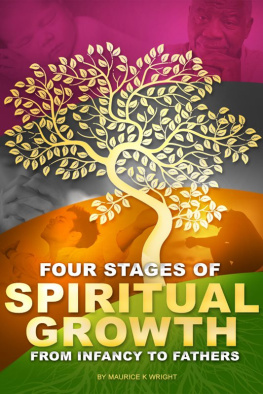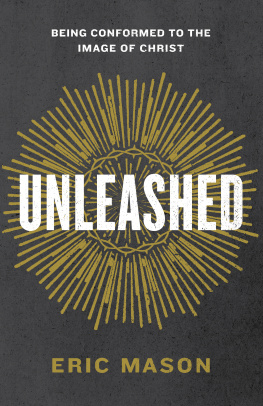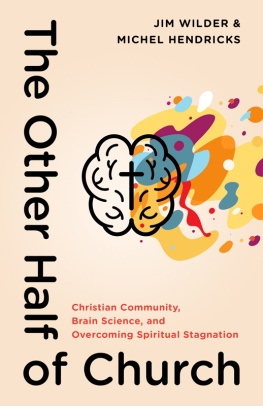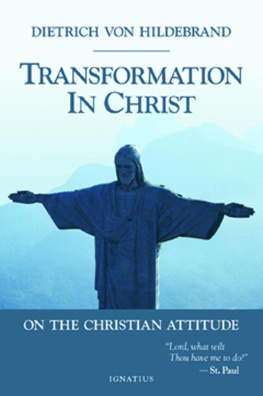B ooks like this are never written without a context. I have been teaching on spiritual formation since joining the faculty at Brisbane School of Theology in 2009 and so thank all the students whom I have had in those classes as we have discussed, wrestled with, and prayed through this material together. This work is much richer because of you. I am particularly grateful to Talia Morris, who first suggested including Spiritual Gifts as a part of the course and led me to research this at greater depth.
I am very thankful to the Board of Brisbane School of Theology for granting me a semester of study leave in 2019 that provided me the space and time to do more extensive reading, reflecting, and writing on this topic and ultimately led to the writing of this book.
I am also grateful to Susan Chapman, John Coulson, Simon Longdon, Susan Prince, Kevin Town, and Wally Wang for reading through drafts of this book. Thankyou for being my human laboratory by helping me think through the material more clearly, including its practical application.
Most of all I am deeply grateful to my family, who are the crucible for this transformation into Christlikeness being experienced and lived out. Without you this work would be far less than it is.
Prologue
T he Bible uses many metaphors for the transition that occurs at the moment of Christian conversion. For example, from spiritual death to spiritual life (Eph :, ); from slaves to sin to slaves to righteousness (Rom :); from lost to found (Luke :); and from enemies of God to friends of God (Eph :; Rom :). But in Corinthians , where Paul contrasts the old covenant of the Law with the glorious new covenant of Christ, he writes, Even to this day when Moses is read, a veil covers their hearts. But whenever anyone turns to the Lord, the veil is taken away ( Cor :). Like having the blindfold removed at a surprise party, at conversion the Holy Spirit removes our spiritual blindfold and we begin to see things with a spiritual clarity that we never could before ( Cor :). This raises the question though as to what happens next. Pauls explanation comes in that same verse: And we all, with unveiled face, beholding the glory of the Lord, are being transformed into the same image from one degree of glory to another (ESV). That is, we begin a lifetime journey of transformation into the likeness of Christ. And just in case we are tempted to think we can somehow bring about this transformation ourselves, Paul adds that this transformation comes from the Lord ( Cor :).
Have you ever considered how God brings about this transformationthe means God uses to grow Christians? How this growth begins, and how it continues? If youre a Christian reading this, can I ask you more personally: how do you continue growing spiritually when you have been a Christian for a while? How do you prevent the practice of the spiritual discipline of meditating on Gods word from becoming mechanical when you have read through the Bible many times? How do you learn to pray? How do you persist in prayer when you have lived long enough to experience things that you have prayed for many times not come to pass? How do you remain sensitive to personal sin when it has been years since youve done something you are really ashamed of? How do you continue being conformed to the image of Christ for the rest of your life rather than simply putting your spiritual gearstick into neutral and coasting into eternity?
As someone who has been a Christian for many years, and who has more years behind him than ahead of him, these questions are not hypothetical, but personal. On my best days I revel in Gods glorious gospel, long to spend even more time with him in fervent prayer, treat my family with kindness and compassion, and unashamedly share the gospel with unbelieving friends and acquaintances. On many days, however, I find myself untouched by the words of Scripture, distracted in prayer, thinking ill of people who I perceive have wronged me, and focused on daily circumstances rather than the return of the Lord Jesus.
If any of this resonates with you, then I encourage you to keep reading. For this is a book written by a fellow traveler who longs to finish the Christian life strongly rather than simply limp to the finish line. It is written both for newer believers as well as mature ones. It is written for those who have made enough mistakes to know they are still capable of making more and yet desire to live increasingly in holiness while still feeling the pull of the sinful nature. This book aims to give hopeboth to the weary and the strongthat through the means of grace God provides they can continue growing as Christians, or resume growing if their growth has slowed or stunted.
The book first explores the contours of this spiritual journey of transformation into the likeness of Christ before introducing the means God uses to bring this about: the Holy Spirit, people, circumstances, suffering, practice of spiritual disciplines, and the use of spiritual gifts. Each of these means are then expanded upon and illustrated. The book aims to be practical with ideas and suggestions that one might apply quickly. My prayer as I have been writing is simply that in reading it you will grow more like Christ.
Chapter
What is Spiritual Formation?
Transformation into Christs Image
Introduction
T he words spiritual or spirituality are used commonly in our twenty-first-century world.
This is in stark contrast to the biblical view. The Bible does not use the term spirituality but does describe the spiritual person and what it means to live out the spiritual life. The spiritual person is one who is born of the Holy Spirit (John :; Rom :; Cor :; John :; :). The hallmark of the spiritual person is that their behavior accords with that of the Spirit himself who brings about this spiritual transformation (Rom :; :; Gal :). The spiritual life, then, is having Gods Spirit increasingly take control of a persons life so that they think, speak, and act like the Lord Jesus (John :; Rom :; :; :, ; Gal :; Eph :; :; Col :; Thess :; Tim :; :; Tim :, ).
Spiritual Transformation
Spiritual transformation is initiated at the moment of conversion and therefore is grounded in a Christians election and status as Gods redeemed child and a coheir with Christ (Rom :; Eph :). As this transformation proceeds over time, spiritual growth occurs. It is concerned with lives redeemed, fueled, and surrendered to the Holy Spirit. Furthermore, [t]he purpose of Christian spiritual formation is relationship and likeness to the person of Christ, [and] the conformity of our [lives] as [both] community and individuals to the wonderful life and message of Christ. John Calvin expands on this union with Christ when he writes,












